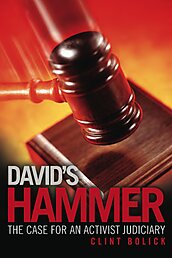VIDEO: View the author discussing this book on YouTube.
PODCAST: Listen to the author discuss his book.
Judicial activism is condemned by both right and left, for good reason: lawless courts are a threat to republican government. But challenging conventional wisdom, constitutional litigator Clint Bolick argues in David’s Hammer that far worse is a judiciary that allows the other branches of government to run roughshod over precious liberties. For better or for worse, only a vigorous judiciary can enforce the limits on executive and legislative action, protect constitutional rights, and tame unelected bureaucrats.
That, Bolick demonstrates, is exactly the role the framers intended the courts to play, envisioning a judiciary deferential to proper democratic governance but bold in defense of freedom. But the historical record is painfully uneven. During the Warren era, courts protected freedom of speech and equal protection of the law but denigrated other important rights and took on executive and legislative powers that brought disrepute to the judiciary. The Rehnquist Court restored some balance, reining in judicial excesses and protecting property rights, but stopped far short of the activist judicial role the framers charted for the courts in policing conduct of other branches of government that exceeds constitutional boundaries.
Bolick showcases numerous real-world examples of people whose rights to free speech, economic liberty, equal protection of the law, and private property were violated by government—victims of government oppression whose only recourse is the courts. David’s Hammer reclaims for the judiciary its intended role as the ultimate safeguard of a free society.
David’s Hammer is the recipient of the Lysander Spooner Award for Advancing the Literature of Liberty.
Production of David’s Hammer was made possible with the generous assistance of Steve G. Stevanovich.
